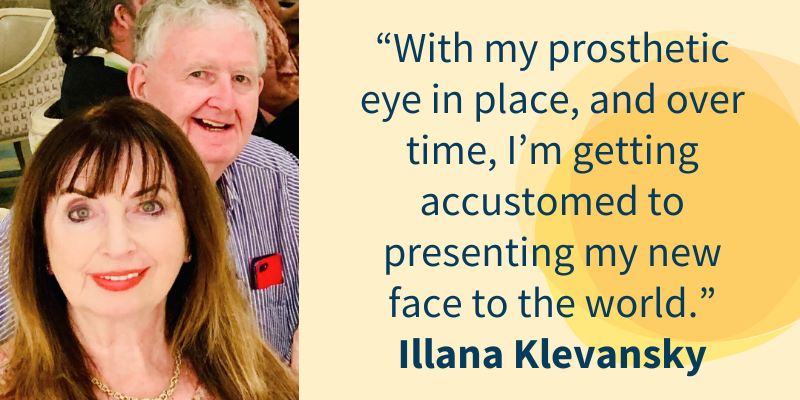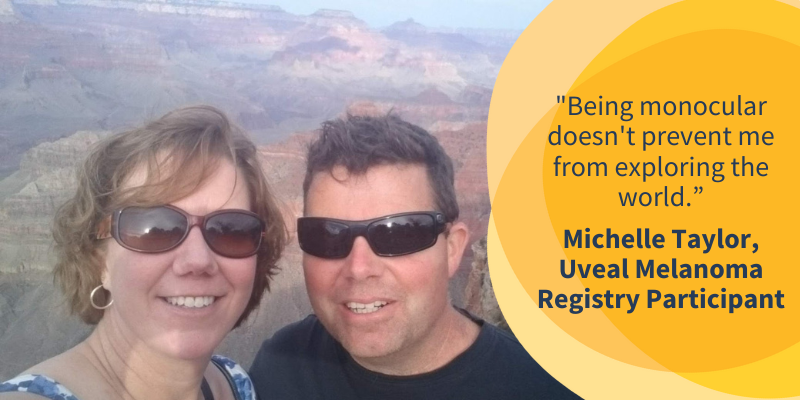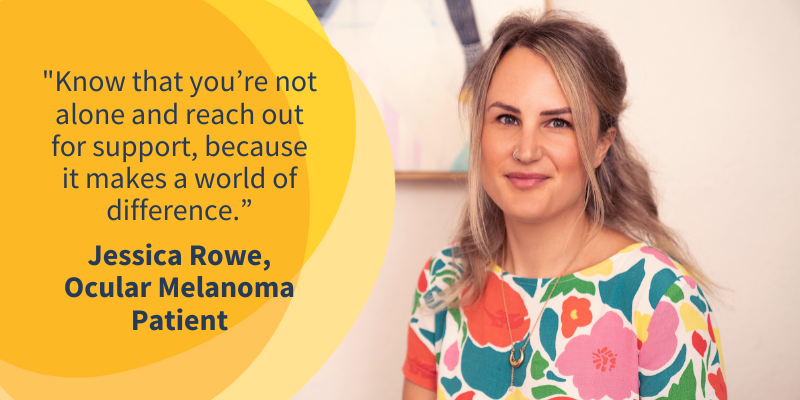Patient Stories
Every ocular melanoma patient has a unique story
Illana Klevansky
Diary of an ocular melanoma patient
Three years ago, in 2021, I was diagnosed with ocular (eye) melanoma. The news was so traumatic. I began dealing with it in the only way that I tend to deal with things, and that’s by writing down my thoughts and fears. So, I started a journal. This excerpt chronicles the events leading up to having my eye surgically removed and my post-operative experience along this life-changing journey.
10 February – 11 June 2021: Diagnosis
It began in February when I had my annual eye health checkup at Specsavers. The optometrist, who I’d seen several times in the past, showed me photos of my eye over the previous couple of years. She pointed out that there was a tiny freckle in my right eye. A little freckle. A naevus. So benign. But at this latest visit she shocked me by saying that something serious was happening and that I needed to urgently consult an ophthalmic specialist as I could have an ocular melanoma on the rim of my optic nerve.
What?
There and then, she referred me to Dr Tim Isaacs at the Perth Retina Clinic, and three days later I had an appointment with him.
I feel like all my senses have shut down! I still cannot believe it! I had my first consultation with Dr Isaacs, who wants to run a few more tests, as well as giving me some time to digest all this information. He discussed experiences of other patients, people like me who desperately hoped to hang on to their binocular vision.
But he explained that the probability with an ocular melanoma such as this, there were few options ahead. The most drastic, and the only way to prevent the cancer from spreading, is to remove my right eye. As hard a prognosis as it is now, Dr Isaacs says that I will cope very well if my eye is removed.
I’m senseless! Can’t describe my terror. I’m blindsided. Can’t stop crying. I feel I’m in a dark tunnel, without seeing any light ahead. Will I still be able to cry from both sides when one eye is gone? I have cancer. And I must face it.
Dr Isaacs referred me to Artificial Eye Services, who make prosthetic eyes for people in my situation. So, I’ve now met with Jenny, Paul and Emily Geelen. They explained how their ocularist services have successfully helped many patients over a long period of time. They’ve assured me that they’ll make a temporary prosthetic, which will be inserted during the surgery. Then, after a few weeks, they’ll manufacture a permanent prosthetic, which will be moulded to fit my eye socket, and which will give me greater confidence.
14 June 2021: Before the surgery
I’m immobilised. It’s so big to comprehend. The operation looms. Feeling fragile and fragmented. Today was my final consult with Dr Isaacs. He was very kind and careful with me, because he realises that I’m so anxious about what’s ahead. We are lucky to have Dr Isaacs give us as much information as possible. At the end of the day, my wonderful husband Ian and I are acutely aware that Dr Isaacs is trying to save my life.
I’m doing everything automatically, but I am treading water in a state of suspended animation. I cannot speak to anyone around me because my fear is crystalized into silence.
This time next Friday I’ll only have one eye. But I won’t have cancer. Can’t think. Am terrified. My new reality. Disfigured. Distraught. I’m diffused with sadness.
Most of all, I’m consumed with fear. I’m trying to think ahead but worry about how my world will look for the rest of my life.
A one-eyed view of the world, no pun intended. Wish I could laugh at my own stupid witticisms. Wish I could stop crying. Wish I could go back. Wish my parents were here. Thank God they don’t have to see me like this. So many regrets. So many memories. I need to stop wallowing! Ian and I lie awake at night, not daring to voice our fears to each other. Yet I know what he’s thinking…
I keep looking at my eyes in the magnifying mirror. They look perfect. Blue. Beautiful. Deadly.
I keep thinking of everything I need to do with both eyes. Books to read. Stories to write. Movies, things, places to see. Wish I could stop thinking. Wish I could turn off the words whirling inside me. Wish this wasn’t happening.
How will I look? Will I be able to look at my half face? It’s so confrontational!
Will those around me look at me and recoil? I’ve had many health issues over the years: a melanoma on my scalp, a melanoma on my leg, now a melanoma within my eye! Each time, I’ve bounced back, but this time I don’t feel very strong. I must keep reminding myself: I’m NOT a victim! I’m just SO SAD!
I don’t want to wake up next Friday to face what’s happened to my face. Don’t want to think how to be calm. How to glibly chat and reassure everyone that I’m coping, acting as though everything is fine. Yet I’m devastated! I don’t want to alarm my family that I’m terrified, immobilised with fear, but I need to show them that I’m strong.
15 June 2021: Surgery is only days away
I’ve rationalised my fear into three areas:
- I have cancer. That’s HUGE to deal with.
- I’m going to have one eye with which to see. That’s daunting. And this is for the rest of my life.
- I’ll be disfigured. My new face will be very different to my previous face.
So, these last few days before surgery, I’m taking photos of my eyes so that I remember how I used to look.
I still can’t believe this is happening to me, it’s quite surreal. It’s inconceivable that I look so normal, yet there are deadly cells growing inside me!
I keep crying.
I CANNOT CONTROL MYSELF. Every couple of hours it hits me, and I think OMG, this time next Saturday I won’t have my right eye. Never could I have imagined that I would accede to having my eye cut out of my face!
8 July 2021: Three weeks after surgery
NEVER! Inconceivable! Unacceptable! Yet here I am, nearly three horrible weeks later, with only one eye! I must keep reminding myself that this was done to give me a second chance. That this will give me and my family a healthier way to live our lives together. My bruises are healing. In the next week, Artificial Eye Services will fit me with my made-to-measure new eye.
I’M SO GRATEFUL THE WORST PART OF THE LAST FEW MONTHS ARE BEHIND ME! Thank God for Ian. I don’t know how he’s put up with me through all this. I’m lucky!
With each visit to the Geelens, as confronting as it is to force myself to look at my unfamiliar new self, it’s incredible to watch them at work as they spend so much time fashioning my permanent prosthetic. They are so painstaking in the way they look at every colour striation in my left eye. Their artistry is simply awesome.
2 February 2022: Six months after surgery
IT’S MY 70TH BIRTHDAY. What a year this has been! But I’m healthy!
When I reflect on the last few months, I realise that I’ve learned to trust my own intuition. I’m becoming accustomed to the fact that my left eye is compensating for whatever I used to do with binocular vision. Thank goodness that after six months, I started driving again. Very cautiously. I work out where I need to go, which roads I need to negotiate. When will I need to change lanes.
This is what upsets me the most: It’s taken time for me to look at myself in the mirror with my new prosthetic eye, which was perfectly created by Jenny, Paul and Emily Geelen. For me, it’s very confronting when my prosthetic needs to be removed for cleaning.
I still can’t look at myself without being very emotional. There are still moments when I can’t reconcile the visual ruin of my right eye. But when my prosthetic is in place, and over time, I’m getting accustomed to presenting my new face to the world. Friends come up to me and inspect my face, trying to determine which eye looks different. My artificial eye is very comfortable, and perfectly colour-matched to my left eye, which is due to the amazing and professional artistry of the Geelens.
12 May 2023: A new health concern
As I was starting to move on from my ocular melanoma experience, I suffered an aortic dissection, requiring emergency cardiac surgery, and then I had two small strokes. I’m still not allowed to drive, but that’s a minor temporary setback. The best news of all: after worrying about the health of my heart and brain, I NEVER think about the loss of my right eye!
12 May 2024: Three years on
I need to express my everlasting thanks to the incredible support given to me by Dr Tim Isaacs at the Perth Retina Clinic, and to Jenny, Paul and Emily Geelen at Artificial Eye Services. Between this team, my ocular melanoma was handled with complete professionalism and kindness, as they guided me through the darkness of my trauma to seeing the light!
After three years, I’ve come from a drastic diagnosis to the light of living. I now have follow-up PET scans every six months and am completely comfortable with monocular vision.
I’m extremely grateful that I’ve been given TWO life-saving chances to live with my incredible husband Ian, watch my children and grandchildren grow, and to thank everyone who is still involved in safeguarding my health.
Michelle Taylor
A new vision for uveal melanoma
After a shock diagnosis that resulted in her losing an eye, Michelle Taylor found herself desperately seeking information about ocular melanoma. Now Michelle’s joined the Uveal Melanoma Registry, so others don’t have to encounter the lack of clarity that she did.
When Michelle suddenly lost much of the vision in her right eye, she assumed it was a detached retina – a relatively common issue that can be resolved with minor surgery.
It wasn’t until an ophthalmologist referred her to see another specialist the very next morning – an “expert in his field” – that she began to suspect she was dealing with something more worrying than a detached retina.
A quick Google search of the doctor’s name confirmed her fears. The specialist in question was an ophthalmologist who specialised in cancer.
A series of tests found that Michelle’s loss of vision was a result of a large choroidal melanoma in her eye. The size and location of the tumour meant that enucleation – the removal of her eye – was necessary.
Just 10 days later, Michelle underwent the life-altering surgery.
“It all happened so quickly that the whole thing felt like a dream. I didn’t really have time to fully process it until my eye was gone,” Michelle said.
“I was devastated, but my family and our sense of humour helped raise my spirits. When they visited me in hospital after the operation, they brought me a present that still makes me laugh to this day: an eraser in the shape of an eyeball.”
When Michelle Googled the name of her specialist, she didn’t know that it would be the start of a long journey of searching for information about uveal melanoma.
“Aside from international references and social media support groups sharing second and third hand information on management and treatment options, there just wasn’t much out there that was Australian and I really felt alone and in the dark,” Michelle said.
“My ophthalmologist put me in touch with Prof Anthony Joshua who gave me a clear treatment plan and suddenly I felt like I was in the right place. I felt seen.”
“It was at this time that I discovered AOMA and their website, where everything I wanted to know about my condition was in one place. It was incredible to learn that a group of Australian experts were working on treatments and management options for uveal melanoma. It was an exciting prospect and gave me hope for the future.”
Michelle enrolled in the Uveal Melanoma Registry, which is gathering patient data from sites throughout Australia, Europe and the US to support the development of novel therapies for this disease.
“It’s my goal to help make a difference and ensure others don’t have to go through what I did – the uncertainty and lack of information. By taking part in the Uveal Melanoma Registry and sharing my knowledge with others going through an ocular melanoma diagnosis, I hope that I can do my small part to be a beacon of shining light in their darkness.”
Jess Rowe
Finding the light of support in the darkest of times



Jodee Rich’s Story
Dr Ian Kamerman’s Story
Jess Van Zeil’s Story
Research
Communications
Support




